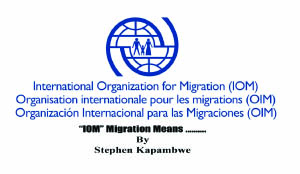ACROSS generations, human beings have migrated in search of a better life. However, hopes of an improved life do not always materialise.
Lured by the false promises of traffickers, many victims of trafficking are subject to abuse and violations of human rights of the worst kind, including violence at the hands of traffickers or migrant smugglers whilst in transit, and ultimately facing sexual or labour exploitation.
Zambia is a source, destination and transit point for trafficking in persons.
However, the complexity of population movements from, to, through and within Zambia is becoming increasingly more evident and often includes refugees, asylum seekers, victims of trafficking and unaccompanied and separated minors.
Many persons fleeing persecution or severe economic hardship are confronted with life threatening situations of violence and poverty.
Persons on the move, particularly those who enter a country irregularly, are often subject to abuse and violations of human rights, including violence (such as gender based violence – GBV – or child abuse), by smugglers and traffickers, labour and sexual exploitation, and denial of access to basic human rights.
 The human rights of all people on the move should be respected, protected and fulfilled irrespective of an individual’s reason for travelling and irrespective of their legal status.
The human rights of all people on the move should be respected, protected and fulfilled irrespective of an individual’s reason for travelling and irrespective of their legal status.
The Zambia Guidelines for the Protection of Vulnerable Migrants, which was officially launched in 2014, highlights that migrants’ rights include the right to life; freedom from inhumane or degrading treatment; freedom from slavery and forced labour; a fair hearing, in a language that they understand; the right to health and social services; the right to non-discrimination or treatment, including on the grounds of race, religion, gender, amongst others; and the right not to be returned to a country where they would be persecuted, tortured or not have access to adequate protection.
Many vulnerable people on the move are in need of protection. Timely identification of those with protection needs is crucial in ensuring that their rights are protected. The general public has an important role to play in this.
In 2014, with support from UN partners and the European Union, the Government of Zambia officially launched Tools for the Protection of Vulnerable Migrants, including referral guidelines, which are designed to help ensure migrants reach much needed services, such as shelter, healthcare and legal assistance.
The general public, including migrants themselves, are encouraged to reach out to Zambia Police Victim Support Unit, the Department of Immigration, or Social Welfare who can be contacted to provide support.
The International Organisation for Migration (IOM) is also available to provide assistance to vulnerable migrants.
As stated by the IOM Director General, Ambassador William Lacy Swing on International Migrants Day, “migration is not only inevitable, but also necessary and desirable”.
By working together, we can ensure that the rights of vulnerable migrants are upheld.
There is a story of an unaccompanied migrant child – based on real events
Sarah is from a neighbouring country. She is 15 years old. She grew up living with her grandmother since her mother moved to Zambia when she was very young.
Sarah and her grandmother were very close, and Sarah’s grandmother did what she could to provide for Sarah’s needs with her limited income.
In 2010 Sarah received a letter from her mother. The letter said Sarah should travel to Zambia to live with her mother.
Sara’s mother explained that life was good in Zambia and that Sarah would be able to go to school when she arrived there.
Sarah was very excited about being reunited with her mother whom she had not seen for many years. She packed her belongings and set off for Zambia, eager to see what her new life would hold.
However, just a few months after arriving in Zambia, Sarah’s mother became unwell and passed away. After her mother’s death Sarah continued to live with her stepfather. But she was always treated differently to her half-brothers and sisters who were all in school.
Sarah had not attended school since arriving in Zambia, but rather had to help around the house and looked after the young children in the home. She S often requested that her stepfather send her to school but to no avail.
About 18-months after her mother’s death, Sarah’s step-father became angry and threw her out of the house, saying that there was no longer room for her there.
He told Sarah that she was not welcome and that since they were not even related he had no obligation to take care of her.
Not knowing where to go, Sarah found herself on the streets in central Zambia. After three nights, a woman, Musonda, took her in and gave her food and somewhere to sleep for the night.
The next day Musonda took Sarah to the Department of Social Welfare, who referred her to a local shelter provider where she was taken care of and counselled.
Whilst at the shelter, Sarah expressed her desire to go back to her home country where her grandmother and other members of her family were still living.
After this, partners worked together and facilitated her safe return home, where she was reunited with her grandmother and received counselling and other kinds of support.
She has since returned to school and is training to become a social worker so that she can help others who find themselves in situations like hers.
www.iom.int/ www.iom.org.za






